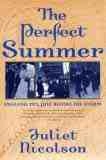Non-Fiction Reviews
The Perfect Summer by Juliet Nicolson

- The Perfect Summer: England 1911, Just Before the Storm
- Grove Press, 290 pp.
A Prelude to War
“The season from May to September 1911 was one of the high sunlit meadows of English history. It was a time when England – rich, happy, self-indulgent and at least slightly decadent – felt most contentedly itself.”
By design, Juliet Nicolson’s brief, pre-World War I narrative reads much like a memoir, and through a prism of nostalgia tempered with suggestions of political turbulence and sexual dalliance, her book succeeds, ultimately emerging as a snapshot of a culture in transition. In Britain, while many of the familiar routines of the nineteenth century have vanished, change brought with it a mixture of excitement and anxiety. The rapidly increasing military and naval power of Germany, as well as the continuing debate between the Unionists and those who supported Home Rule in Ireland, were England’s most pressing international issues. Domestically, there was the simmering internal unrest associated with the large labor force of industrial England which was beginning to flex its influence, as it moved toward achieving full political maturity. As Nicolson observes, “The profound despair felt among the poor of the country remained unvoiced no longer, and strike action marked the whole summer of 1911. Even domestic servants were beginning to question their long-accepted role.”
And yet, although the Age of Edward was over, among the privileged, with their servants, their houses, their money, and the convenient rigidity of the class system, there was an unspoken determination that a supremely enjoyable way of life should not be altered as the crown shifted from one head to another. Hopeful that the momentum generated by Edward would remain powerful enough to ensure their untroubled existence, by May of 1911 the aristocracy was looking forward to a glorious summer dominated by the coronation of George V and filled with an unprecedented number of parties. To be sure, the exuberance and self-congratulatory spirit of those few months was in many ways as tangible as it might have been illusory. As Osbert Sitwell, friend of the Prime Minister’s wife, Margot Asquith, and one of society’s most glamorous escorts, observed some time later “an air of gaiety, unusual in northern climates, prevailed. Music flowed with the lightness and flash of water under the striped awnings and from the balconies; while beyond the open illuminated windows in the rooms, the young men about to be slaughtered, feasted, unconscious of all but the moment.”
But, as one might anticipate after reading Nicolson’s Acknowledgements – “I am extremely grateful to Her Majesty the Queen,” etc. – essentially, the book remains a story of British upper classes and the author has seemingly trawled an impressive body of memoirs and biographies so as to bring to life any number of entertaining, if gossipy personal vignettes. For example: “Life without champagne was inconceivable for Winston [Churchill].” “Henry Crust joining Lord Curzon in a nude tennis doubles tennis match against George Wyndham and Wilfrid Blunt.” “[The Earl of Lonsdale]…a man apparently incapable of enjoying a healthy sex life with a member of his own class: he collapsed, dead of a heart attack while in action in his own private brothel.”
Indeed, as related by Nicolson, the fashions of the time “positively invited flirtation and dalliance.” For grander evening occasions, married women displayed erotically low-cut décolletage, and the innovative French couturier, Paul Poiret, had recently brought his sheer evening gown La Vague across the Channel. The dress “fell straight from the bosom to swirl seductively and wave-like round the body, allowing a tantalising glimpse of the natural feminine curves beneath. A new form of underwear, the brassiere, permitted the full form of the body to be defined more clearly.” Cinq-d-sept appointments – the late afternoon and early evening hours allocated for sex – “thrived under the complicit though theoretically unseeing gaze of the servants.” While the servants’ hall, it was said, was privy to more secrets than Asquith’s cabinet, actress Mrs. Patrick Campbell was reassuring. “Does it really matter what these affectionate people do in the bedroom,” she asked, “as long as they don’t do it in the street and frighten the horses?”
But there is a serious side to The Perfect Summer and this is perhaps best illustrated in the story of Brian Calkin, to whom Nicolson repeatedly returns throughout the book. Calkin, a former chorister and soloist with St Paul’s Cathedral Choir, overstated his age (he was sixteen at the time) and joined the Queen’s Royal West Surrey Regiment. On 6 June 1917, sixteen days short of the sixth anniversary of the coronation at which he had sung for the King of England and the German Kaiser in Westminster Abbey, Brian was in France with his regiment. He wrote his family a letter and, on the front of the envelope, “To be opened only in the event of my being killed in action.” Brian survived the next attack though he was severely gassed, earning himself a precious few weeks at home to convalesce before returning once again to the front line. While he was in England, unknown to his family he gave the sealed envelope to his father’s office manager at Lloyd’s insurance brokers for safe-keeping. In July 1918, only four months before the war’s end, Mrs. Calkin was given her son’s letter to open. Brian was twenty years old. When taken in concert with the rest of the book, Calkin’s story, while admittedly poignant, seems to accurately reflect the times – the fall from optimism into melancholy – that embraced the British Empire in the early twentieth century. It is a thoughtful and particularly effective way to end the narrative.
The Perfect Summer is a best-seller in England and its market – as reflected in the lack of academic citation protocols – seems to be the more general reader who possesses some measure of interest in nineteenth century British cultural and social history. And, to this end, Juliet Nicolson provides ample food for thought, for the book is briskly written, entertaining, and certainly brings a refreshing perspective to period studies.
Brett F. Woods received his Ph.D. in Literature from the University of Essex, England. Celebrity Net Worth and Bio’s






You must be logged in to post a comment Login